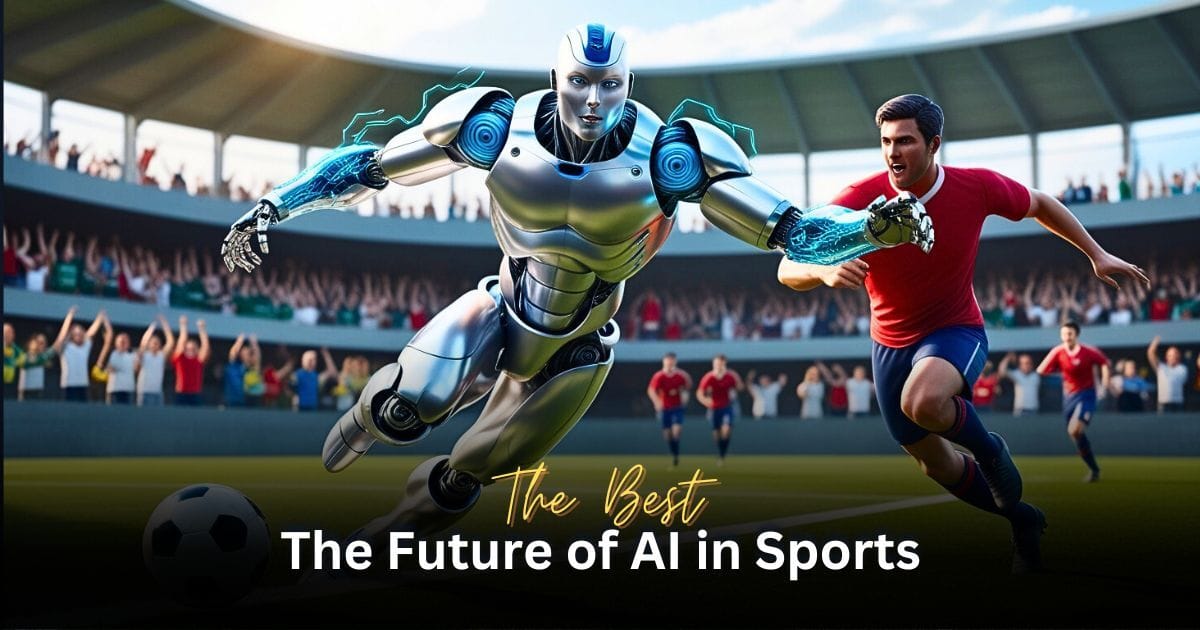- Algo Vault
- Posts
- The Future of AI in Sports
The Future of AI in Sports
Enhancing Performance and Fan Engagement
Artificial intelligence (AI) is no longer a futuristic concept reserved for tech enthusiasts; it’s a powerful tool that is rapidly transforming the world of sports. From improving athlete performance to enhancing fan engagement, AI is redefining how we experience and interact with sports. In this article, we’ll explore the ways AI is shaping the future of sports and what we can expect in the years to come.

1. Performance Analytics and Athlete Development
One of the most significant impacts of AI in sports is its ability to enhance athlete performance through advanced analytics. By analysing vast amounts of data, AI can identify patterns and trends that were previously undetectable by human coaches. For example, AI-powered tools can track an athlete’s movement, technique, and biometrics in real-time, providing detailed insights into their performance. This data can then be used to optimise training routines, prevent injuries, and develop personalised strategies that cater to an athlete’s strengths and weaknesses.
In addition to real-time analysis, AI can also predict future performance based on historical data. By examining past games, training sessions, and even external factors like weather conditions, AI can offer predictions and recommendations that help athletes prepare more effectively for upcoming events.
Example: Professional football teams are increasingly using AI to analyse player performance during matches, allowing coaches to make real-time decisions based on data-driven insights. This approach not only improves individual performance but also enhances team dynamics and strategy.
2. Injury Prevention and Recovery
Injuries are an inevitable part of sports, but AI is helping to reduce their frequency and severity. Through predictive analytics, AI can identify risk factors that may lead to injuries, such as overtraining or improper technique. By monitoring an athlete’s physical condition and performance data, AI can alert coaches and medical staff to potential issues before they become serious, allowing for timely interventions.
Moreover, AI is playing a crucial role in injury recovery. Personalised rehabilitation programs powered by AI can adapt to an athlete’s progress, ensuring that recovery is as efficient and effective as possible. Virtual physical therapists and AI-driven recovery tools are also becoming more common, providing athletes with tailored exercises and monitoring their recovery in real-time.
Example: In basketball, AI is being used to monitor players’ movements and identify stress points that could lead to injuries. By addressing these issues early, teams can reduce the risk of injury and keep their players in peak condition.
3. Enhancing Fan Engagement
AI is not just transforming the on-field action; it’s also revolutionising how fans experience sports. Through AI-driven platforms, fans can enjoy personalised content tailored to their preferences, such as customised highlights, real-time statistics, and interactive experiences. AI is also being used
to create virtual and augmented reality experiences, allowing fans to immerse themselves in the game like never before.
AI-powered chatbots and virtual assistants are also enhancing fan engagement by providing instant access to information, answering questions, and even facilitating ticket purchases. For example, AI can analyse a fan’s behavior and preferences to suggest relevant content, merchandise, or events, creating a more personalised and interactive experience.
Social media platforms are leveraging AI to create engaging content, such as automated highlights, player statistics, and predictive insights during live games. This not only keeps fans engaged but also encourages them to share and interact with content in real-time, amplifying their connection to the sport and their favorite teams.
Example: Major sports leagues are using AI to offer fans personalised highlights of their favorite players and teams, tailored to their viewing habits. This level of customization keeps fans engaged and coming back for more.
4. Enhancing Coaching Strategies
Coaching is both an art and a science, and AI is adding a new dimension to the science part. AI-powered analytics can help coaches make data-driven decisions, from selecting the best lineup to developing game strategies that exploit the weaknesses of the opposition. By analysing game footage and real-time data, AI can identify patterns that might not be visible to the human eye, allowing coaches to adapt their tactics on the fly.
Moreover, AI can simulate various game scenarios, providing coaches with a deeper understanding of potential outcomes based on different strategies. This enables them to prepare their teams more effectively, increasing the likelihood of success on game day.
5. AI and Esports: The Next Frontier
As esports continues to grow in popularity, AI is playing an increasingly important role in this digital arena. AI is being used to analyse gameplay, develop advanced strategies, and even create AI-powered opponents that challenge players in new and innovative ways. Moreover, AI is helping to enhance the viewing experience for esports fans, providing real-time analytics, predictions, and personalised content that make the competition even more exciting.
Conclusion: Embracing the Future of AI in Sports
The future of AI in sports is bright, with the potential to revolutionise everything from performance analytics and injury prevention to coaching strategies and fan engagement. As AI technology continues to evolve, its impact on the sports industry will only grow, offering new opportunities for athletes, coaches, and fans alike.
By embracing AI, the sports world can push the boundaries of what’s possible, creating a more dynamic, competitive, and engaging environment for everyone involved. Whether you’re an athlete looking to enhance your performance, a coach seeking a competitive edge, or a fan wanting a more immersive experience, AI is set to transform your sports experience in exciting and innovative ways.